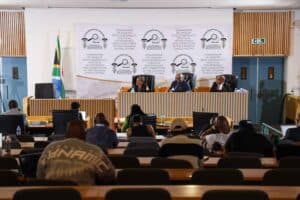The Presidency accuses DA leader John Steenhuisen of trying to control Cyril Ramaphosa’s foreign policy decisions under the guise of the GNU.

The Presidency has accused DA leader and Minister of Agriculture John Steenhuisen of trying to micromanage the government of national unity (GNU) and President Cyril Ramaphosa.
Ramaphosa’s spokesperson, Vincent Magwenya, said although the DA retained the right to maintain their individual foreign policy position, the party could not impose that position on the president under the guise of the GNU.
“Their statement is an attempt to micromanage the president, which will not be allowed regardless of the importance and the respect the president attaches to the GNU.
Steenhuisen accused of micromanagement
“He will not be micromanaged by the DA, or any party for that matter, in the exercise and management of foreign policy,” Magwenya said.
Magwenya was responding to Steenhuisen’s statement in which he distanced the DA from Ramaphosa’s recent statement during bilateral engagements with Russian President Vladimir Putin. Ramaphosa reportedly said “Russia is a valuable ally and friend.”
The president is currently attending the Brics summit in Kazan, Russia, where the economic bloc of developing countries was expected to make a resolution about the “de-dollarisation” of international trade.
It meant they would boycott the US dollar and trade in their local currencies among themselves. But there was doubt that India would join the arrangement as New Delhi is close ally of Washington.
Steenhuisen said the DA, as a key partner in the GNU, rejected “this characterisation in no uncertain terms”.
“The DA does not consider Russia, or Vladimir Putin, to be an ally of our nation.
‘Russia, Putin not an ally’ – Steenhuisen
“We cannot and will not agree that South Africa should consider an authoritarian regime, that is currently violating international law by waging an imperialist war of aggression against a sovereign state, as an ally.
“At a time when South Africa is experiencing renewed optimism with the first real prospects of economic growth in almost two decades, our government simply cannot afford to make statements that could jeopardise international relations and trade opportunities, which are crucial for realising our key objectives of growth and job creation,” Steenhuisen said.
The DA leader’s statement appeared to contradict his recent utterances in which he said he was not opposed to visiting Russia during the Brics summit if invited by Ramaphosa, as long as that was in the interest of the country.
ALSO READ: Brics summit ‘not anti-US’
He made similar statements about China, saying he visited China recently in the interest of the SA as minister of agriculture.
However, the leader has made a sudden U-turn.
“As leader of the DA in the GNU, I reiterate the importance of positions expressed on behalf of the GNU being the subject to full and proper debate within the government mechanisms before being announced as positions of the GNU to ensure maximum consensus and agreement amongst the parties to the GNU,” Steenhuisen said.
U-turn on China
Political analyst and international relations expert Dr Jan Venter of North-West University said although the DA appeared to be conforming with the ANC on certain aspects of foreign policy now that the party was in the GNU, the two parties did not have a common position on Russia and China.
“They think they can, in a certain way, march to their own drumbeat, to their own interests, rather than what the ANC’s and the government’s position has been for a long time.
“I don’t think the DA shares the ideological connection that the ANC government has with Russia and China. But its position now is one of ‘we will change the system from within’,” Venter said.
ALSO READ: More nations join Brics? Demand for membership has set unprecedented records
University of South Africa politics professor Dirk Kotzé said the fact that the DA accepted South African participation in Brics did not mean the party approved of Russia and China.
“Steenhuisen looks at Brics broadly as an opportunity for South Africa, but that does not mean he politically condones what is happening in Russia with regards to Ukraine.
“Also, the DA’s policy towards China has not changed,” Kotzé said.
DA’s China policy has not changed
The DA, like all parties in the GNU, was trying to strike a balance between its own policies and satisfying the needs of its constituencies.
“Members of all parties were not prepared for this. They will get criticism from their own members for adopting certain position in the GNU that contradict their policies.
“These parties are walking a very fine line. The leaders of these parties are careful not to lose their support,” Kotze said.
NOW READ: Ramokgopa hints at courting Brics over electricity needs






